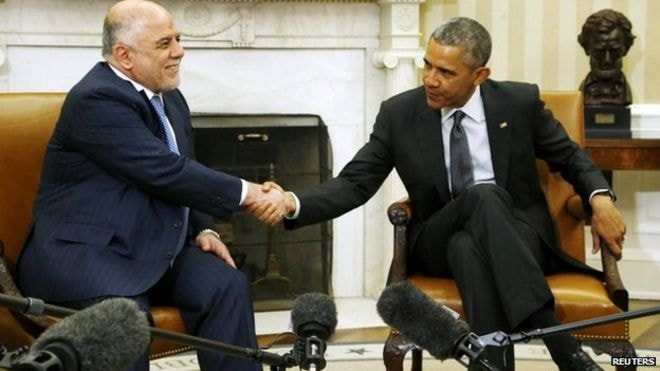US support for Iraq: Containing Iranian influence
(Baonghean) - During his first visit to the US as Iraqi Prime Minister, Haider al-Abadi successfully sought military support worth hundreds of millions of dollars from the US to fight against the self-proclaimed Islamic State (IS) terrorist group. This is a really important development in the context of the war against IS entering a fierce phase. However, the more notable aspect is related to the US policy towards this Gulf country. Observers believe that one of the reasons why the US "generously" supports Iraq is because this is an opportunity for President Obama's administration to curb Iran's influence on Iraq as well as regional issues.
The US involvement in Iraq remains a sensitive issue for the US. Ending the decade-long war in Iraq was the pledge that brought President Obama to his second term, so the increased US presence in Iraq has caused Mr. Obama to face a lot of opposition from the public at home.
Americans do not want to get involved in another war in the region, while the Republican-controlled Congress is also making things difficult for the Obama administration with budget restraints.
However, during his meeting with Iraqi Prime Minister al-Abadi, US President Barack Obama pledged to continue supporting Iraq in training and equipping it with weapons in the fight against the self-proclaimed "Islamic State" (IS) as well as providing humanitarian aid to the people of this Gulf country.
Specifically, President Obama said he would provide $200 million in humanitarian aid to help Iraq rebuild civilian areas devastated in the recent war against IS, such as around the city of Tikrit and several other places.
 |
| US President Barack Obama (right) receives Iraqi Prime Minister Haidar al-Abadi at the White House on April 14. |
It is not difficult to understand the “generosity” of the US towards Baghdad. Recent advances in the fight against IS in Iraq have made it “easier for the US to decide” to support Iraq. According to the latest announcement, the US said that after airstrikes by the US-led coalition and the Iraqi army, IS has lost control of 20 to 30% of its territory.
Of course, to speed up the process of completely defeating IS, the US needs to play a bigger role in this war and supporting Iraq is necessary. Moreover, the Obama administration has more "sympathy" for the Iraqi government under Prime Minister al-Abadi after a period of tension with the government of his predecessor - Nuri Al Maliki. However, all of this is considered to be just the "surface" of the problem. Observers believe that the main reason for the US increasing support for Iraq is because of another factor, Iran.
Before Prime Minister al-Abadi's visit to the US, the Iraqi government had hinted that if it did not receive help from Washington, it would continue to rely on neighboring Iran, which has been providing them with a lot of support since the war against IS began.
At this point, Iran is the only country that can bring together the Kurds, the Iraqi army and the Shiite militias to deal with IS. Objectively speaking, the fight against IS has brought Iraq and Iran closer together.
This has really concerned the Americans, even expressing concern. The US has always said that Iran’s support for Iraq against IS is “a positive thing if it does not cause sectarian divisions”, implying that Iran could take advantage of the fight against IS to take sectarian revenge against Sunnis. This concern is not unfounded as Iraq is inheriting a legacy of sectarianism, with conflicts between Sunni and Shiite communities.
According to analysts, many people have thought that the Iraqi army will become a Shiite Muslim force and will become Iran's "eyes and ears" in Iraq in the future. Because currently the government in Baghdad is majority Shiite, while the Shiite civilian force armed by Iran accounts for about 2/3 of the Iraqi forces.
US officials fear sectarian conflict as Shiite forces may oppress the Sunni community after repelling IS militants. Furthermore, they worry that Iran will also expand its influence not only in Iraq, Syria and Yemen but also in other areas of the Middle East - where many US strategic interests are.
Iran’s influence in Iraq has long been undeniable, but never before has that influence been so evident as in the past year, when the Iraqi army could not resist the IS forces that were rampaging across the north of the country. Iraqi officials have praised Iran’s quick response to urgent requests for weapons and assistance on the front lines, while criticizing the international coalition for not providing support on the ground.
Before his visit to the US, Prime Minister Al Abadi frankly said that the US has increased its support "but we want to see more," especially in the context of Baghdad's efforts to retake much of the territory that fell to IS militants last year. Therefore, the commitment to support Iraq recently made by President Obama is considered an opportunity for the US to increase its influence in this country as well as prevent Iran's growing influence in Iraq./.
Thanh Huyen






